I wouldn’t make a good pirate.
Pirates are known for many things, like robbing, killing, and pillaging. Do you know what else pirates are good at? Understanding the value of money. I clearly don’t, since I spent CA$100 on Libertalia: Winds of Galecrest, and $20 of that portion going towards shipping and handling because being Canadian isn’t cheap. Then again, you are reading this from a guy who spends thousands of dollars every few years to get new computer hardware to play video games. I wouldn’t be surprised if my computer has enough power to fight God at this point.
First, the game. What’s it’s about? You are pirates of the airborne kind. Like your sea counterparts, you want to have the best retirement plan and that means money. You will attend three voyages with each voyage lasting a fixed number of days. Each day will have a random set of Loot tiles, and you will know all of the Loot tiles in advance.
Any Loot worth taking will attract the attention of a crew, and each Voyage starts by drawing six crew members out of a deck of forty cards with one tiny little twist: Everyone draws the same cards. So you are aware of everyone’s tools, and they are aware of yours.
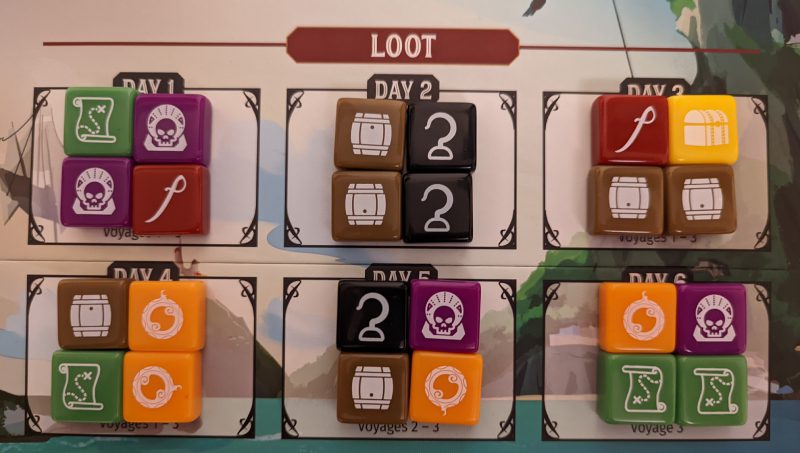
Looting before breakfast
Each day starts by having everyone pick a crew member in secret to send to the Island for Loot. Once everyone has selected their crew member, the cards are revealed and placed on the Island from lowest to highest ranking, meaning a number from 1 to 40.
That in itself sounds pretty boring, and that’s why every crew member is armed with a special ability. Certain abilities are triggered at specific times in the game, such as the Anchor abilities at the end of a voyage or the Night abilities at the end of each day. Of course, they only activate if they are alive in your ship. This is a game about pirates after all, and pirates are known to be violent from time to time. So don’t be surprised to see murder in this game.
The ones you need to look out for are the Daytime and Dusk abilities. Daytime abilities disrupt the status quo, or “Island Hierarchy” if you will. Dusk abilities are meant to have extra effects on top of the usual looting you would do, such as the Cook grabbing two Loot tiles instead of one.
Daytime abilities are first activated from the lowest rank to the highest, while Dusk abilities are activated from the highest rank to the lowest in addition to grabbing a Loot tile. Throw your Smuggler onto the Island and they will sneak away with a Loot tile before anyone gets their hands on it. If you want to cause a ruckus, send the Brute, who will gladly escort the highest-ranked crew member on the Island to the afterlife.
Aerial anarchists
The disadvantage of using this tactic, however, is that your lower-rank crew members will be last in line to select Loot tiles. Despite the name, not all Loot tiles are beneficial. Of course, you have your usual Chests and Amulets that give you doubloons at the end of the voyage or Map pieces that you collect to score a respectable amount of doubloons. On the other hand, Relics make you lose doubloons, while a nasty Saber will erase crew members through violent means.
As if that wasn’t enough, some crew members will interact with your Loot tokens. If you have a Necromancer, you can discard that unwanted Relic to bring back a crew member from the dead. The Merchant can also discard multiple Loots of the same type for some sweet doubloons. Oh look, there are four Sabers on this voyage. Time to murder people and get paid handsomely for it! It’s like running your own private army without any Geneva Convention concerns.
Despite these great examples, they aren’t exclusive to you. Remember, everyone has the same hand of cards, meaning that anything clever you come up with, more than likely your opponents are thinking the same thing.
It’s a game about picking a card in secret, revealing your choices, and watching abilities fire away like cannons in a systematic fashion created by your group. Most importantly, it is fair.
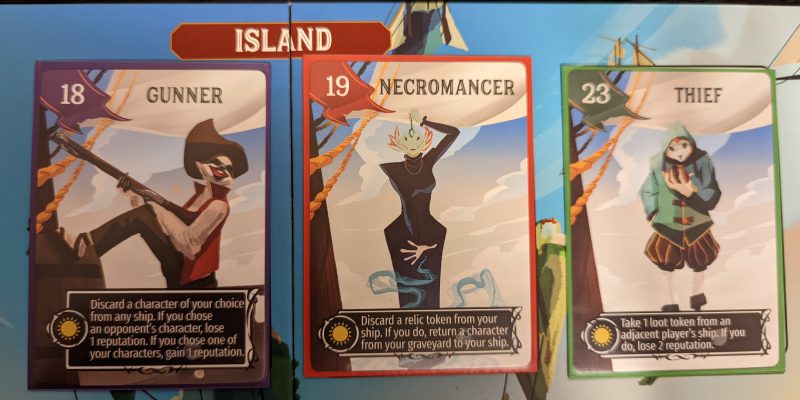
Owning the sails
Unlike many other games that focus on high player interaction full of nasty surprises, Libertalia is willing to deliver you a Carrack full of information to pillage. You know everyone’s cards. You know what Loot is available for this voyage. Tiebreakers are determined by the Reputation track that everyone can see and it can be manipulated. The only thing you need to figure out is what other people’s “best move” is and take advantage of it. It is an arena battle between objective information versus subjective interpretation, and this fight explodes in your living room with every card reveal.
Backstabbing, alliances, and table talk pepper the experience along with the simple card play. It is a game that wants you to be clever as a pirate, and you know what makes a great pirate? They know when to be greedy at the right time.
Now I would be lying if I said that every person I introduced to this game walked away with a smile. It is, without a doubt, a vicious and unforgiving contest. I’ve seen players get frustrated because their decisions left them with the short straw (or none at all!). They felt the outcomes of their choices were barely in their control.
Yet, it’s hard for me to feel empathic towards that complaint. This is a game willing to give you all of the information in the world to make your decision. If you pull out ahead, you spotted an opportunity that other players didn’t recognize. If you get screwed, you read the table wrong. This game holds you accountable for your decisions. Equal opportunities, unequal results.
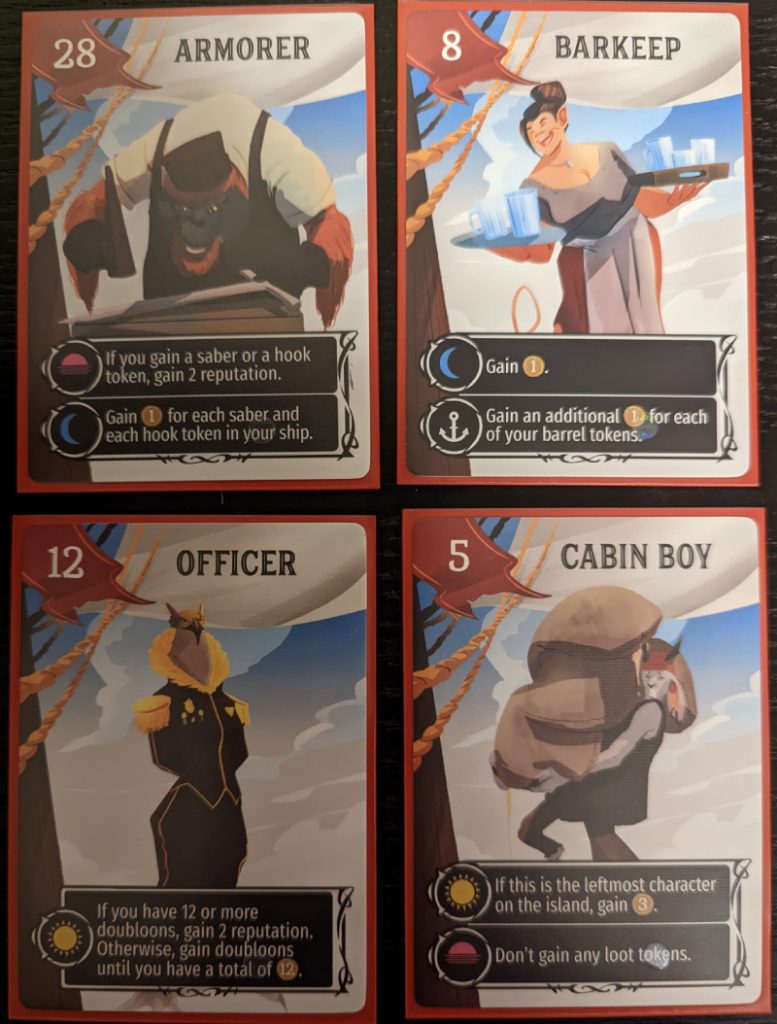
A ship worth admiring
As a person who submerges himself into high player interactive games, there is very little wrong with the design here. Each crew card is powerful and valuable, yet not dominant. Everything feels balanced, which is a statement I thought I would never say about a Stonemaier game. It plays quickly and is easy to teach. It’s hard for me not to pull this out of the gaming shelf since the experience it wants to create is well done.
I only have one genuine concern, and that’s player scaling. It works well with two players, but the skill gap is a big deal since it’s less forgiving. On the other hand, the five to six players can go into chaotic territory. I’ve mentioned that you have all of the information in the world to make your decisions with, but keeping that information in your head at higher player counts is as hard as holding onto an eel with greasy hands. Despite that, this game is still a far better experience at higher player counts than most board games I’ve come across.
Was it a mistake buying this game at $100? Probably, but it is one of the better mistakes I’ve made. I’ve made dumber decisions like selling my black box version of Glory to Rome or backing Rising Sun. Not all purchasing mistakes are made equal, and Libertalia: Winds of Galecrest is proof of that.


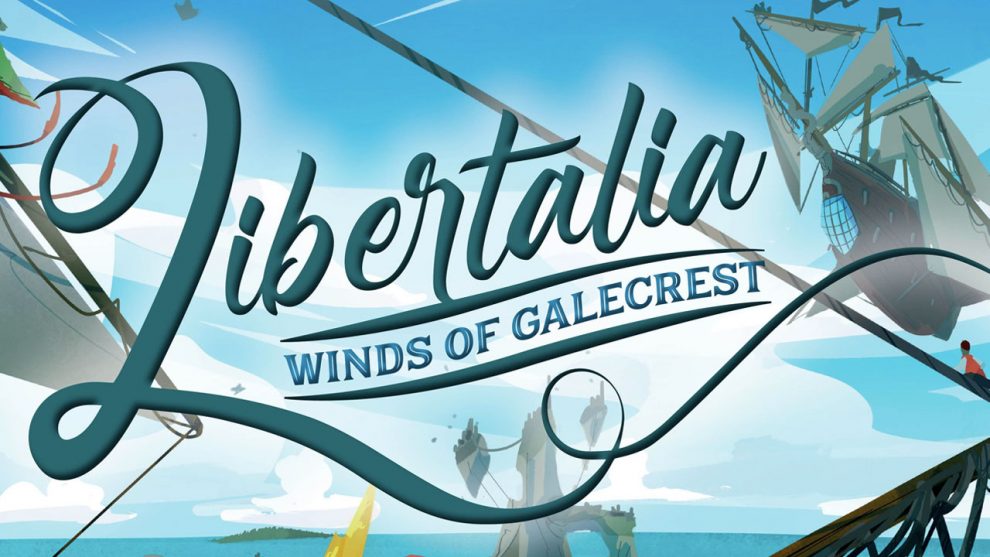


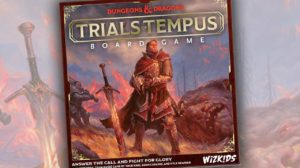






Add Comment